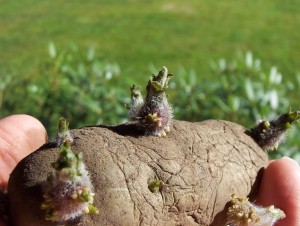Potatoes are a staple food in North America and many other places of the world, but did you know this spuddy delight could possibly kill you? In 1978, a large group of boys in a school suffered from severe diarrhea and vomiting. 17 of them even required to be hospitalized and the 3 most severely affected children were even comatose. The cause? Eating a significant amount of toxic potatoes.
But how could potatoes, something the entire world eats nearly everyday cause such a ruckus? Well, potatoes as we consume them are generally not toxic. However, old potatoes that have started turning green start to produce a toxin called Solanine. Generally, people feel that it is a waste to throw away food and may possibly eat a potato that has slightly turned green, but eating too many of these could possibly destroy your digestive system!

A potato that has started budding could potentially carry a significant dose of Solanine. Image taken from Wikimedia Commons.
A study evaluating the toxicity of solanine found that when rabbits were administered solanine, they encountered breathing difficulties and partial paralysis of limbs. Some were eventually found to be dead. The results of this study highlight how important it is to be mindful of any leftover potatoes that have started turning green or even started budding; it is safer to throw these away rather than risk your personal health just to save a few dollars.
It is very important that more people be informed about this because almost every household in North America consumes potatoes and young children, who are more susceptible to lower doses of toxins are at risk here. Unknowing parents could possibly cook up some greening spuds which, at lower doses may not affect them but could possibly cause their children to fall severely ill.
So, the next time you find a potato that has been left for too long, despite how hungry or strapped for cash you are, please remember that you risk paying a much higher price for eating it than you would throwing it away. However, why should I pick on the potato only? Below is a video showing other commonly consumed items that pose just as much, if not more of a risk than the potato.

